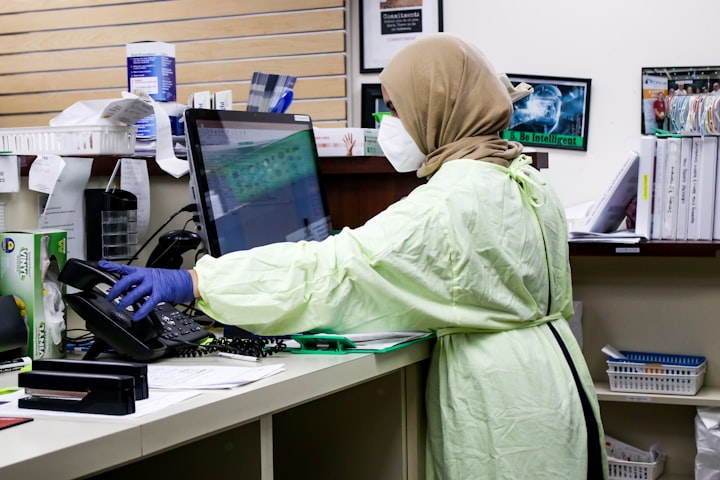Moderna COVID-19 Vaccine
Summary & Information

Information about the Moderna COVID-19 Vaccine
Name of vaccine: mRNA-1273
Design type/type of vaccine: mRNA
Manufacturer: ModernaTX, Inc.
Dosage: 2 shots/28 days apart in the upper arm
------- FACTS/EFFICACY/SAFETY -------
The Moderna vaccine (mRNA-1273) has been recommended for people aged 18 years and older. The Moderna vaccine is the second vaccine approved for authorization in the United States of America. The actual first dosage was administered December 21, 2021 to prioritized populations, adhering to the FDA’s (Food and Drug Administration) emergency use authorization. The United Kingdom authorized the Pfizer/BioNTech vaccine first and the United States was the first country to allow the use of the Moderna vaccine to the public, after substantial Research and Development (R&D) with collaboration with the National Institutes of Health (NIH) as well as manufacturing support from the government. Just a week after Pfizer/BioNTech's mRNA shot, the FDA approved the Moderna mRNA-1273 vaccine. On November 30, 2020, Moderna announced there was a 94.1% efficacy in preventing disease in adults and this was after releasing positive interim results in a phase 3 trial on November 16th, 2020. Moderna submitted their EUA (Emergency Use Authorization) application the same day (November 30, 2020) to the FDA. On December 18, 2020, the FDA authorized the use of the mRNA-1273 vaccine after an external panel advising the FDA approved the vaccine’s benefits outweigh the risks in a 20-to-0 vote, December 17, 2020. There was one abstention during the 20-to-0 vote from the external panel. The Moderna mRNA-1273 vaccine comes from a biotech company called Moderna. The biotech company Moderna is in Cambridge, Massachusetts. 20 million doses were delivered to the US by the end of 2020 and that is enough shots for close to 10 million people. There is an expected 85 million to 100 million doses that will be ready by the end of March 2021.
The National Institutes of Health (NIH) began testing three different vaccine doses in a phase 1 trial. The phase 1 trial involved 45 adults, ages 55 years or younger. Studies showed two of the doses triggered the expected immune response, including neutralizing antibody responses similar to those that were recovering from COVID-19. No serious safety concerns were raised. The same phase 1 trial was expanded to include 40 older adults. The National Institutes of Health launched a phase 2 trial which included 600 volunteers in the month of May 2020 to confirm the dose and to assess safety concerns. Meanwhile, a preclinical study published in July 2020 showed monkeys who were vaccinated, challenged with virus, rapidly cleared the pathogen from their bodies. The following month a story was published that found that in mice, the vaccine successfully prevented infection in the lung and nose. Phase 3 began in late July 2020. Phase 3 was a randomized controlled trial that included just over 30,000 volunteers across 99 sites in the U.S. Enrollment Services was slowed in September to increase minority participation. In a combined phase 2 and 3 trial in mid-December Moderna began enrolling 3,000 teens as young as 12, with results expected in the spring of 2021. This combined phase 2 and 3 trial was the result of the trial only including people over the age of 18.
The mRNA-1273 vaccine has a 94.1% in efficacy in preventing symptoms of COVID-19 after the second injection. This means that a vaccinated person has a 94% reduced risk of becoming sick, compared to someone who wasn’t immunized. The true effectiveness of the vaccine could differ outside of a trial and may be lower. The actual efficacy figure is based on observing a total of 196 symptomatic COVID-19 cases, 185 of which were in the placebo group versus 11 in the vaccine group. The efficacy was a bit lower in adults 65 years of age or older (86.4%), according to the Food and Drug Administration’s (FDA) summary of the company’s data. Earlier interim results did not suggest any differences in efficacy across age, race and ethnicity, or gender. The Moderna vaccine also protects against severe cases of COVID-19. The trial also showed all 30 cases of severe COVID-19, including one death, occurred in the placebo group. Moderna revealed during their meeting with the Food and Drug Administration’s (FDA) advisory committee on the 17th of December 2020, that there was one severe COVID-19 case that had not been fully assessed in the vaccine group.
It is not known yet how long the vaccine will protect against disease or whether the vaccine can prevent infection or prevent the spread of the virus to others.
There haven't been any reports made about serious side effects with recipients who have taken the mRNA-1273 vaccine. In 1% of participants in both the vaccine and placebo groups in phase 3 had serious adverse events, which refer to potentially life-threatening or disabling events. Three cases were considered by the FDA to be likely due to the vaccine: one case of uncontrollable vomiting and two cases of facial swelling, which occured in women who had had cosmetic dermal filler injections in the past six months. A third case of facial swelling ----- not considered severe ----- also involved a woman that had previously had a dermal filler injection in her lips. She experienced a similar reaction following an influenza shot. Just as the Pfizer/BioNTech vaccine, there was a slightly higher number of Bell's palsy cases, which is a form of temporary facial paralysis. There were three instances out of more than 15,000 vaccine recipients and one in a similarly sized placebo group. The Food and Drug Administration (FDA) haven't determined whether the condition was triggered by the vaccine or not but suggests ongoing surveillance. The two vaccines are different and do not have the same components. The Centers for Disease Control and Prevention (CDC) has issued similar guidance for both mRNA vaccines, the Pfizer/BioNTech vaccine & Moderna vaccine, due to both vaccines having some similar ingredients. This also includes not getting the vaccine if you have had a severe or immediate allergic reaction to one of the ingredients in either vaccines, such as polyethylene glycol.
January 5th, 2021, the Centers for Disease Control and Prevention (CDC) told FactCheck.org that there were 29 confirmed cases of anaphylaxis, a life-threatening allergic reaction, following administration of the Moderna vaccine as well as the Pfizer/BioNTech vaccine. No breakdown of the instances were reported with each vaccine, but roughly that is around 5.5 cases of anaphylaxis per million doses. The Centers for Disease Control and Prevention (CDC) emphasized that anaphylaxis is a rare outcome and cautioned that the rate may change as more data is collected.
Temporary side effects may occur: pain at the injection site, swelling of the lymph nodes in the vaccinated arm or redness around the injected spot in the arm, fatigue, headache, tiredness, muscle or joint pain, and chills. These side effects have been summarized by the FDA and are more likely to occur in younger adults compared to adults 65 years or older. The side effects start typically within a day or two of getting the vaccine. There might be flu-like symptoms and might affect your ability to do daily activities, they should go away in a few days. The mRNA-1273 vaccine DOES NOT CONTAIN: eggs, preservatives or latex. Scientists say this is a sign that the shots are working as they should, these reactions can be unpleasant. Clinical trials have shown reactogenicity symptoms (side effects that happen within 7 days of getting vaccinated) are common but are mostly mild to moderate. Side effects such as chills, fever, tiredness and headaches were found more common throughout the body after the second dose of the vaccine. Again, most side effects were mild to moderate. A small amount of people had severe side effects that affected their ability to do daily activities. Here is what we know now based on evidence from clinical trials. The Moderna vaccine was 94.1% effective at preventing laboratory confirmed COVID-19 illnesses in people who received two doses and had no evidence of being previously infected. Among people of diverse age, sex, race, and ethnicity categories and among persons with underlying medical conditions, the vaccines appeared to have high effectiveness in clinical trials (efficacy). Few people were admitted to the hospital and this happened less often in the people who received the Moderna vaccine compared to people who received the saline placebo. The Centers for Disease Control and Prevention (CDC) will continue to update us as we learn more about how well the Moderna vaccine works in real world conditions.
Here are some Demographic information from clinical trials for the Moderna vaccine including people from the racial and ethnic categories:
79.4% Caucasian
20% Hispanic/Latino
9.7% African American
4.7% Asian
<3% other races/ethnicities
Here is the age and sex breakdown from the clinical trials for the Moderna vaccine:
52.6% male
47.4% female
25.3% 65 years and older
(82%) Most people participating in the trials were considered to have an occupational risk of exposure, 25.4% of them being healthcare workers.
22.3% of people who participated in the clinical trials had at least one high risk condition, which included lung disease, heart disease, obesity, diabetes, liver disease, or HIV infection. 4% of participants had two or more high risk conditions.
------THOUGHTS------
I have not been the one to shy away from immunizations and encourage everyone to check regularly with their doctor as well as get immunized. I myself have taken the Moderna mRNA-1273 vaccine on the 13th of January, 2020 and I feel absolutely fine. My second dose will be on February 10, 2020 and I believe that it is needed like any other immunization shot.
SOURCES/RESOURCES
https://www.cdc.gov/coronavirus/2019-ncov/vaccines/different-vaccines/Moderna.html
https://www.sciencenews.org/article/covid-19-coronavirus-moderna-vaccine-fda-approval#:~:text=For%20Pfizer%2C%20that%20efficacy%20was,lower%20efficacy%20of%2086.4%20percent.
https://www.factcheck.org/2020/12/a-guide-to-modernas-covid-19-vaccine/
Thank you for taking the time to read this informational article. Please stay safe and healthy!
About the Creator
De'John Connerly-Bey
Writer. Artist. Songwriter. Performer. Actor. Musician. Dancer.






Comments
There are no comments for this story
Be the first to respond and start the conversation.